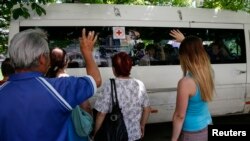KYIV —
Ukraine's president has called for humanitarian corridors to be opened in the country's east to allow civilians to escape fighting between Ukrainian forces and pro-Russian separatists.The United States is urging Russia to do its part to stabilize eastern Ukraine.
Ukrainian President Petro Poroshenko issued a statement Tuesday calling for security forces to provide protective corridors for residents in order to “avoid new victims” in areas where counter-insurgency operations are taking place.
Ukrainian armed forces have stepped up a so-called “anti-terrorist operation” in the Donbas region of eastern Ukraine, the heart of a pro-Russian separatist uprising.
A spokesman for the operation, Vladyslav Seleznyov, told reporters Tuesday he could not give details of any security operations, but said they will make arrangements for civilians.
He said “there is coordination between anti-terror forces and local authorities in order to provide corresponding help to people trying to leave this territory of active operations.”
Russian Foreign Minister Sergei Lavrov said Tuesday that Moscow welcomes Ukraine's decision to establish humanitarian corridors in eastern Ukraine.
Officials report heavy fighting between Ukrainian and rebel forces overnight around Slovyansk in Donetsk province, one of the areas under separatist control.
Poroshenko discussed prospects for a ceasefire during a meeting with Russian President Vladimir Putin in France last week.
Ukraine has accused Russia of supporting the insurgency in the east, ferrying supplies and fighters across the border into Ukraine. Russia denies directly supporting the rebellion and has accused Ukraine of hostility toward Russian-speaking residents of the east.
World leaders meeting last week in Brussels condemned Russia for destabilizing Ukraine. Members of the so-called G-7 group of industrialized nations issued a statement calling on Russia to withdraw troops from the border and use its influence among armed separatists to bring an end to the fighting.
Speaking to reporters in Kyiv Tuesday, U.S. Assistant Secretary of State for European Affairs Victoria Nuland urged Russia to act on G-7 demands.
“It is unacceptable for the Russian Federation to be allowing the kind of fighters and weapons and materiel that we've seen and you saw in the G-7 statement that came out of Brussels that closing the border is one of things we're asking President Putin to work with the Ukrainian government on on an urgent basis,” said Nuland.
The G-7 also threatened sanctions on anyone found to be violating Ukraine's sovereignty and threatening the peace. The United States and the European Union have already imposed some targeted sanctions against Russian companies and individuals following Russia's annexation of Crimea in March and its alleged fueling of violence in eastern Ukraine.
Meanwhile, Moscow and Kyiv continue to negotiate a solution to a gas pricing dispute after Russia threatened to cutoff supplies to Ukraine over unpaid debts.
Representatives of both sides and the European Union have been meeting this week in Brussels to discuss the terms of a new deal.
Ukrainian President Petro Poroshenko issued a statement Tuesday calling for security forces to provide protective corridors for residents in order to “avoid new victims” in areas where counter-insurgency operations are taking place.
Ukrainian armed forces have stepped up a so-called “anti-terrorist operation” in the Donbas region of eastern Ukraine, the heart of a pro-Russian separatist uprising.
A spokesman for the operation, Vladyslav Seleznyov, told reporters Tuesday he could not give details of any security operations, but said they will make arrangements for civilians.
He said “there is coordination between anti-terror forces and local authorities in order to provide corresponding help to people trying to leave this territory of active operations.”
Russian Foreign Minister Sergei Lavrov said Tuesday that Moscow welcomes Ukraine's decision to establish humanitarian corridors in eastern Ukraine.
Officials report heavy fighting between Ukrainian and rebel forces overnight around Slovyansk in Donetsk province, one of the areas under separatist control.
Poroshenko discussed prospects for a ceasefire during a meeting with Russian President Vladimir Putin in France last week.
Ukraine has accused Russia of supporting the insurgency in the east, ferrying supplies and fighters across the border into Ukraine. Russia denies directly supporting the rebellion and has accused Ukraine of hostility toward Russian-speaking residents of the east.
World leaders meeting last week in Brussels condemned Russia for destabilizing Ukraine. Members of the so-called G-7 group of industrialized nations issued a statement calling on Russia to withdraw troops from the border and use its influence among armed separatists to bring an end to the fighting.
Speaking to reporters in Kyiv Tuesday, U.S. Assistant Secretary of State for European Affairs Victoria Nuland urged Russia to act on G-7 demands.
“It is unacceptable for the Russian Federation to be allowing the kind of fighters and weapons and materiel that we've seen and you saw in the G-7 statement that came out of Brussels that closing the border is one of things we're asking President Putin to work with the Ukrainian government on on an urgent basis,” said Nuland.
The G-7 also threatened sanctions on anyone found to be violating Ukraine's sovereignty and threatening the peace. The United States and the European Union have already imposed some targeted sanctions against Russian companies and individuals following Russia's annexation of Crimea in March and its alleged fueling of violence in eastern Ukraine.
Meanwhile, Moscow and Kyiv continue to negotiate a solution to a gas pricing dispute after Russia threatened to cutoff supplies to Ukraine over unpaid debts.
Representatives of both sides and the European Union have been meeting this week in Brussels to discuss the terms of a new deal.




